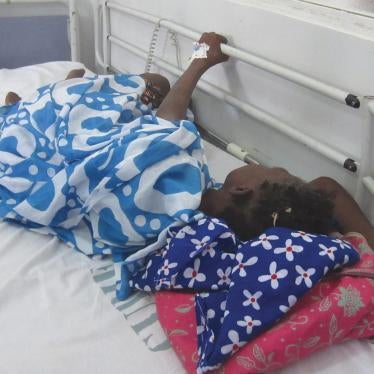No one should die like Bineta Ndeye.
I was shocked back into remembrance of this brave, little girl as I previewed a new documentary on the needless suffering of children in pain in Senegal. The documentary was shot by Unreported World, a Channel 4 news program, and will air tonight. Watching the clip took me right back to Senegal where a colleague and I were researching a Human Rights Watch report, “Abandoned in Agony,” on the same topic a few years ago.
That was where we met Bineta Ndeye. Her story shook us to the bone.
Bineta began experiencing stomach pain in May 2011. She lost her appetite, began losing weight, became feverish, and started vomiting frequently. A “small ball” developed in Bineta’s abdominal area and her pain grew severe.
A regional hospital diagnosed Bineta with neuroblastoma, a common childhood cancer, but did not give her anything for pain. Bineta’s parents, subsistence farmers, raised the money to travel with their daughter to a hospital in Senegal’s capital, Dakar, for surgery and chemotherapy. There, after enduring two months of agony, Bineta finally received morphine syrup, a cheap medicine recommended for moderate to severe cancer pain. She was finally able to sit up and sleep peacefully.
Unfortunately, Bineta’s second course of post-operative chemotherapy was cut short. Her family could no longer afford it, so she returned home. Not only did this compromise Bineta’s chances of survival, it also meant an end to her pain treatment. Oral morphine is not available outside of Dakar, so the parents would have to travel there once a week to pick up a new prescription, something they could not afford. After suffering for three months at home, Bineta’s mother made the journey with her back to Dakar to obtain treatment for her unbearable pain only to find there was a morphine shortage. Bineta died on March 1, 2013, suffering from unalleviated, severe pain.
Krishnan Guru-Murphy of Unreported World traveled across Senegal to bear witness to the agony experienced by tens of thousands of Senegalese who, like Bineta, suffer due to lack of strong pain medicines. His documentary is tough to watch but it reveals the scandal of the unnecessary and enormous suffering that occurs in dozens of low and middle income countries. Despite the fact that strong pain medicines like morphine cost almost nothing, it is not available to many millions of patients because of neglect or bad government policies.
My hope is that this documentary will help to convince governments and public health donors that it is high time for us to bring this outrageous situation to an end. We have all the means to do it, so why aren’t we acting?





